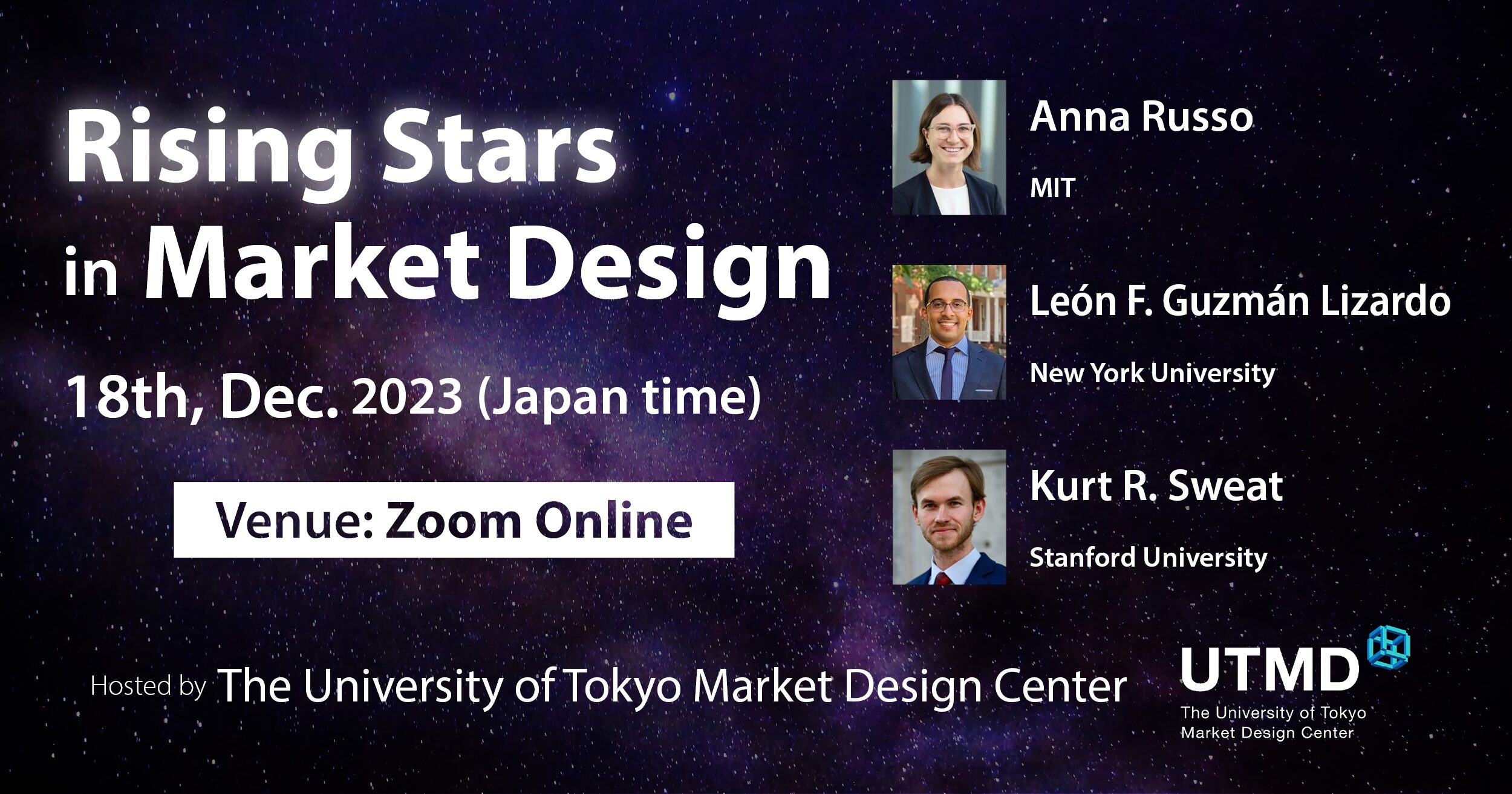9:00am-12:20pm(JST)
For Researchers
2023-24 Rising Stars in Market Design

We will host an international workshop “2023-24 Rising Stars in Market Design” presented by young researchers on the 2023-2024 academic job market on December 18 (JST).
Event Information
Date & Times: 9:00am – 12:20pm, Monday, December 18 (JST)
Venue: Zoom online (pre-registration system)
Language: English
*Please refrain from taking pictures, recording audio and video.
*Please do not reproduce the contents or share the Zoom joining URL with a third party.
Program
Anna Russo (Massachusetts Institute of Technology)
Date & Time: 2023/12/18 (Mon) 9:00-10:00am (JST)
Title: Additionality and Asymmetric Information in Environmental Markets: Evidence from Conservation Auctions with Karl M. Aspelund.
Abstract: Market mechanisms aim to deliver environmental services at low cost. However, this objective is undermined by participants whose conservation actions are not marginal to the incentive — or “additional” — as the lowest cost providers of environmental services may not be the highest social value. We investigate this potential market failure in the world’s largest auction mechanism for ecosystem services, the Conservation Reserve Program, with a dataset linking bids in the program’s scoring auction to satellite-derived land use. We use a regression discontinuity design to show that three of four marginal winners of the auction are not additional. Moreover, we find that the heterogeneity in counterfactual land use introduces adverse selection in the market. We then develop and estimate a joint model of multi-dimensional bidding and land use to quantify the implications of this market failure for the performance of environmental procurement mechanisms and competitive offset markets. We design alternative auctions with scoring rules that incorporate the expected impact of the auction on bidders’ land use. These auctions increase efficiency by using bids and observed characteristics to select participants based on both costs and expected additionality.
León F. Guzmán Lizardo (New York University)
Date & Time: 2023/12/18 (Mon) 10:10-11:10am (JST)
Title: Matching Students and Professors in Higher Education
Abstract: In higher education, various assignment rules exist for pairing students with course professors, ranging from simple random assignment approaches to mechanisms that grant students considerable choice. How do these contribute to learning and the efficient use of instruction inputs? This paper develops an econometric framework to estimate student-professor match effects, and uses the framework to evaluate how students’ choice over instructors contributes to learning. I extend the literature on teacher value-added by showing how to use sequences of subject-related courses to non-parametrically identify instructor-specific learning production functions when instructors differ in both their grading policies and teaching abilities. The framework accommodates endogenous course selection, course dropout, and discrete scoring, all ubiquitous in higher education. Using post-secondary academic records, I estimate the model and document the existence of substantial student-professor match effects. However, when allowed to choose, students do not always select the instructor from whom they will learn the most; they place as much weight on expected grades. Relative to the current assignment rule, assigning students to the predicted learning-optimal instructor leads to increases in academic achievement and reductions in the course dropout rate.
Kurt R. Sweat (Stanford University)
Date & Time: 2023/12/18 (Mon) 11:20am-12:20pm (JST)
Title: Endogenous Priority in Centralized Matching Markets: The Design of the Heart Transplant Waitlist
Abstract: Centralized matching markets that prioritize specific participants to achieve certain policy goals are common in practice, but priority is often assigned using endogenous characteristics of participants. In the heart transplant waitlist in the United States, the treatment that a patient receives is used to assign waitlist priority. Policymakers recently changed the prioritization in an attempt to reduce waitlist mortality by assigning higher priority to patients receiving specific treatments previously associated with high waitlist mortality. First, I document a significant response to waitlist incentives in treatments given and transplants that take place. Then, I develop and estimate a structural model of treatment and transplant choices to evaluate the effect of the policy change on patients’ outcomes and doctors’ decisions. I find three main results from my model. First, there is little change in aggregate survival, and the effect of the change has been mainly redistributive. Second, the change has effectively targeted patients with lower untransplanted survival, with these patients receiving higher expected survival under the current design. Third, the effect on survival is largely driven by changes in the decision to accept/decline offers for transplants rather than directly due to a change in treatment decisions. The policy implications suggest that future designs of the waitlist should disincentivize declining offers for transplants.
Contact info
The University of Tokyo Market Design Center(UTMD)
Graduate School of Economics, the University of Tokyo
E-mail: market-design[at]e.u-tokyo.ac.jp
Phone: (+81)3-5841-3441

